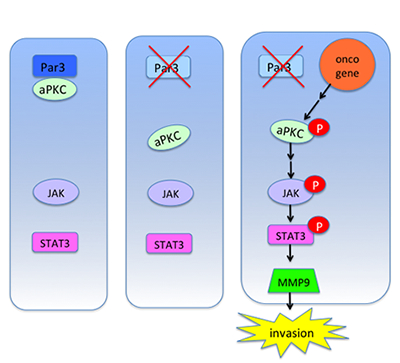Loss of the par3 polarity protein promotes breast tumorigenesis and metastasis.
McCaffrey LM, Montalbano J, Mihai C, Macara IG.
Rosalind and Morris Goodman Cancer Research Centre, Department of Oncology, McGill University, Montreal H3A 1A3, Canada. Electronic address: luke.mccaffrey@mcgill.ca.
Abstract
Loss of epithelial organization is a hallmark of carcinomas, but whether polarity regulates tumor growth and metastasis is poorly understood. To address this issue, we depleted the Par3 polarity gene by RNAi in combination with oncogenic Notch or Ras(61L) expression in the murine mammary gland. Par3 silencing dramatically reduced tumor latency in both models and produced invasive and metastatic tumors that retained epithelial marker expression. Par3 depletion was associated with induction of MMP9, destruction of the extracellular matrix, and invasion, all mediated by atypical PKC-dependant JAK/Stat3 activation. Importantly, Par3 expression is significantly reduced in human breast cancers, which correlates with active aPKC and Stat3. These data identify Par3 as a regulator of signaling pathways relevant to invasive breast cancer.
Copyright © 2012 Elsevier Inc. All rights reserved.
** This paper demonstrates that the polarity machinery plays an important role in human breast cancer progression and that loss of Par3 activates an unexpected signaling pathway, resulting in the induction of the metalloproteinase MMP9, with a consequent increase in tumor invasiveness and dissemination.
